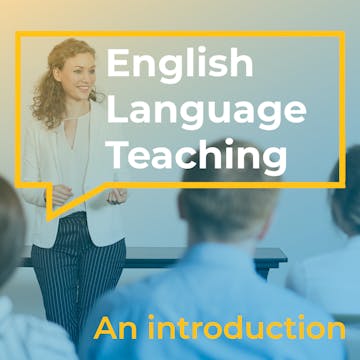
The course will introduce students to basic concepts and issues in English Language Teaching. It will explore the history of ELT, mainstream approaches and new trends. Students will be familiarized with such methodologies as Grammar Translation, Audiolingualism, Presentation, Practice and Production, Communication Language Teaching, Task-based Learning, and Content and Language Integrated Learning as well as alternative methods and approaches such as Storyline and Dogme ELT. Students will examine English as an International Language, the Common European Framework of Reference and also developments in English Language Teaching as a...
Read more
Good to know
Save this course
Activities
Engage in peer discussions
Show steps
Discuss ELT methodologies and share insights with peers.
Show steps
-
Join a peer group or find a study partner.
-
Discuss the ELT methodologies covered in the course.
-
Share experiences and insights on applying the methodologies.
Take online courses on ELT methodologies
Show steps
Supplement your learning by exploring ELT methodologies through online courses.
Browse courses on
Online Courses
Show steps
-
Identify online courses that focus on the ELT methodologies covered in the course.
-
Enroll in the courses and actively participate in the learning activities.
-
Apply the knowledge gained from the courses to your understanding of the methodologies.
Complete practice exercises
Show steps
Practice applying the ELT methodologies covered in the course by completing practice exercises.
Show steps
-
Review the ELT methodologies covered in the course.
-
Find practice exercises that align with the methodologies.
-
Complete the practice exercises, focusing on applying the methodologies correctly.
Three other activities
Expand to see all activities and additional details
Show all six activities
Develop an ELT lesson plan
Show steps
Apply ELT methodologies by creating a lesson plan that incorporates them.
Browse courses on
Lesson Planning
Show steps
-
Choose an ELT methodology and topic for your lesson plan.
-
Design the lesson plan, ensuring it aligns with the chosen methodology.
-
Include activities and assessments that reflect the ELT methodology.
Create ELT materials
Show steps
Reinforce your understanding of ELT methodologies by creating materials that embody them.
Show steps
-
Identify an ELT methodology you want to focus on.
-
Brainstorm and create materials, such as lesson plans, activities, or assessments, that align with the methodology.
-
Share your materials with others for feedback and improvement.
Review ELT methodology case studies
Show steps
Examine real-world examples of ELT methodologies in action through case studies.
Browse courses on
Case Studies
Show steps
-
Identify case studies that demonstrate different ELT methodologies.
-
Analyze the case studies to understand how the methodologies were implemented and their outcomes.
-
Compare and contrast the different methodologies based on the case studies.
Engage in peer discussions
Show steps
Discuss ELT methodologies and share insights with peers.
Show steps
- Join a peer group or find a study partner.
- Discuss the ELT methodologies covered in the course.
- Share experiences and insights on applying the methodologies.
Take online courses on ELT methodologies
Show steps
Supplement your learning by exploring ELT methodologies through online courses.
Browse courses on
Online Courses
Show steps
- Identify online courses that focus on the ELT methodologies covered in the course.
- Enroll in the courses and actively participate in the learning activities.
- Apply the knowledge gained from the courses to your understanding of the methodologies.
Complete practice exercises
Show steps
Practice applying the ELT methodologies covered in the course by completing practice exercises.
Show steps
- Review the ELT methodologies covered in the course.
- Find practice exercises that align with the methodologies.
- Complete the practice exercises, focusing on applying the methodologies correctly.
Develop an ELT lesson plan
Show steps
Apply ELT methodologies by creating a lesson plan that incorporates them.
Browse courses on
Lesson Planning
Show steps
- Choose an ELT methodology and topic for your lesson plan.
- Design the lesson plan, ensuring it aligns with the chosen methodology.
- Include activities and assessments that reflect the ELT methodology.
Create ELT materials
Show steps
Reinforce your understanding of ELT methodologies by creating materials that embody them.
Show steps
- Identify an ELT methodology you want to focus on.
- Brainstorm and create materials, such as lesson plans, activities, or assessments, that align with the methodology.
- Share your materials with others for feedback and improvement.
Review ELT methodology case studies
Show steps
Examine real-world examples of ELT methodologies in action through case studies.
Browse courses on
Case Studies
Show steps
- Identify case studies that demonstrate different ELT methodologies.
- Analyze the case studies to understand how the methodologies were implemented and their outcomes.
- Compare and contrast the different methodologies based on the case studies.
Career center
English Language Teacher
Educational Researcher
Curriculum Developer
Language Consultant
Instructional Designer
Technical Writer
Translator
Content Writer
Speechwriter
Editor
Journalist
Archivist
Museum curator
Librarian
Historian
Reading list
Share
Similar courses
OpenCourser helps millions of learners each year. People visit us to learn workspace skills, ace their exams, and nurture their curiosity.
Our extensive catalog contains over 50,000 courses and twice as many books. Browse by search, by topic, or even by career interests. We'll match you to the right resources quickly.
Find this site helpful? Tell a friend about us.
We're supported by our community of learners. When you purchase or subscribe to courses and programs or purchase books, we may earn a commission from our partners.
Your purchases help us maintain our catalog and keep our servers humming without ads.
Thank you for supporting OpenCourser.


